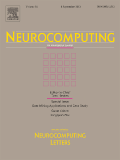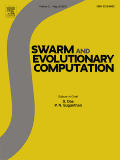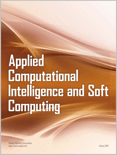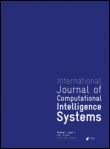
IEEE Computational Intelligence Magazine
Scope & Guideline
Exploring the Frontiers of Computational Intelligence
Introduction
Aims and Scopes
- Computational Intelligence Techniques:
The journal emphasizes various computational intelligence techniques such as genetic algorithms, neural networks, fuzzy systems, and evolutionary computation. These methodologies are explored in both theoretical and applied contexts, highlighting their effectiveness in solving complex problems. - Interdisciplinary Applications:
Research published in the journal often bridges different fields, showcasing the application of computational intelligence in areas such as healthcare, materials science, transportation, and environmental sustainability. This interdisciplinary focus allows for the exploration of novel solutions to real-world challenges. - Emerging Trends in AI:
The journal consistently highlights emerging trends in artificial intelligence, including advancements in machine learning, deep learning, and reinforcement learning. These topics are crucial for researchers and practitioners looking to stay at the forefront of technological developments. - Explainability and Trust in AI:
A significant focus is placed on the explainability of AI systems, addressing the need for transparency and accountability in automated decision-making processes. This area is increasingly relevant as AI technologies become more integrated into society. - Optimization and Decision-Making:
Research on optimization techniques, particularly multi-objective optimization and decision-making processes using computational intelligence, is a core theme. This includes studies on resource allocation, scheduling, and other complex decision-making scenarios.
Trending and Emerging
- Healthcare Applications of AI:
Recent publications demonstrate a significant increase in research focused on the application of computational intelligence in healthcare, including disease detection, medical imaging, and personalized medicine. This trend is driven by the need for advanced technologies to improve patient outcomes and streamline healthcare processes. - Explainable AI (XAI):
The emphasis on explainability in AI systems is rapidly increasing. Researchers are prioritizing the development of methods that enhance the interpretability of models, particularly in critical applications like finance and healthcare, where understanding AI decision-making is essential. - Sustainable AI Solutions:
There is a growing trend towards exploring sustainable AI practices, including energy-efficient algorithms and eco-friendly applications. This reflects a broader societal push for sustainability and the need to address the environmental impact of computational technologies. - Multi-Agent Systems and Collaboration:
Research on multi-agent systems, particularly their collaborative capabilities, is gaining traction. This trend is significant as it aligns with the increasing complexity of problems that require coordinated efforts among multiple intelligent agents. - AI and Privacy Concerns:
As data privacy becomes a critical issue, there is an emerging focus on privacy-preserving techniques in AI. Researchers are exploring methods that ensure data security while enabling effective machine learning, reflecting the need for ethical considerations in AI development.
Declining or Waning
- Traditional Machine Learning Approaches:
There has been a noticeable decline in the publication of papers focusing solely on traditional machine learning techniques, such as basic regression models and conventional classification algorithms. The shift towards more complex and hybrid approaches indicates a growing preference for integrating machine learning with other computational intelligence methods. - Basic Genetic Algorithms:
Papers centered on basic genetic algorithms without enhancements or novel applications are becoming less frequent. Researchers are increasingly exploring advanced variations and hybrid models that incorporate other methodologies, indicating a move towards more sophisticated optimization techniques. - Fuzzy Logic Systems:
While fuzzy systems remain relevant, their standalone applications are declining in favor of more integrated approaches that combine fuzzy logic with neural networks or other AI techniques. This trend suggests a shift towards more comprehensive frameworks that enhance the capabilities of fuzzy systems. - Static Models in AI Research:
The focus on static models that do not adapt to changing environments or data streams is decreasing. Researchers are now more inclined to explore dynamic models that can learn and evolve, reflecting the growing importance of adaptability in AI systems.
Similar Journals

International Journal of Combinatorial Optimization Problems and Informatics
Empowering Scholars in the Realm of Optimization.The International Journal of Combinatorial Optimization Problems and Informatics is a pivotal publication in the realm of combinatorial optimization and its practical applications. Published by the INT JOURNAL COMBINATORIAL OPTIMIZATION PROBLEMS & INFORMATICS, this journal serves as a platform for disseminating high-quality research that bridges theoretical insights and real-world implementation in informatics. With a focus on innovative problem-solving approaches and computational techniques, the journal aims to advance knowledge and foster collaboration among researchers, professionals, and students globally. Despite its relatively recent inception, the journal aspires to carve out a significant niche in the academic community, catering to an audience dedicated to exploring complex combinatorial challenges. The emphasis on open access facilitates broader dissemination of research, promoting inclusivity and engagement within the field. As the significance of combinatorial optimization continues to grow across various disciplines, this journal stands as a valuable resource for cutting-edge research and scholarly discussion.

SOFT COMPUTING
Fostering Interdisciplinary Collaboration for a Smarter FutureSOFT COMPUTING is a premier international journal published by Springer, focusing on the interdisciplinary field of soft computing, which includes areas such as fuzzy logic, neural networks, genetic algorithms, and their applications. With an ISSN of 1432-7643 and E-ISSN 1433-7479, the journal is based in Germany and contributes significantly to the advancement of knowledge in its fields, boasting an impressive Scopus ranking that places it in the top echelons of Geometry and Topology, Theoretical Computer Science, and Software categories. In the 2023 category quartiles, it has achieved Q2 rankings in multiple disciplines, reflecting its high-quality research contributions. Though not Open Access, the journal's rigor and relevance to contemporary issues make it a favored resource for researchers, professionals, and students alike. From its inception in 2000 and spanning across the years until 2024, SOFT COMPUTING continues to serve as a robust platform for innovative research and theoretical advancements, making it an essential read for anyone engaged in the rapidly evolving landscape of computational intelligence.

NEUROCOMPUTING
Advancing Knowledge in Neural Computation and AINEUROCOMPUTING is a premier academic journal published by ELSEVIER, specializing in the interdisciplinary fields of Artificial Intelligence, Cognitive Neuroscience, and Computer Science Applications. With an impressive impact factor and a Q1 ranking in its relevant categories for 2023, NEUROCOMPUTING is recognized as a leader in fostering innovative research and providing a platform for ground-breaking studies. The journal’s scope covers the convergence of neural computation and artificial intelligence, making it essential reading for researchers and professionals seeking to explore the latest advancements and applications in these dynamic fields. For those interested in the cutting-edge intersection of neuroscience and computational techniques, NEUROCOMPUTING offers a wealth of knowledge that significantly contributes to both theoretical and practical advancements. The journal is dedicated to publishing high-quality, peer-reviewed articles and is an invaluable resource for students and established scholars alike, looking to stay at the forefront of research trends.

Swarm and Evolutionary Computation
Exploring the Frontiers of Intelligence and Evolution.Swarm and Evolutionary Computation is an esteemed academic journal published by Elsevier, dedicated to the exploration of innovative algorithms and methodologies derived from principles of swarm intelligence and evolutionary computation. With its ISSN 2210-6502 and E-ISSN 2210-6510, this journal has earned a prominent position in the field, evidenced by its Q1 category rankings in both Computer Science and Mathematics for 2023, reflecting its high impact and relevance. The journal's Scopus rankings further underscore its significance, placing it in the top percentile of mathematics and computer science journals. As an open-access platform, it aims to disseminate groundbreaking research that addresses real-world challenges and fosters interdisciplinary collaboration. Researchers, professionals, and students are encouraged to engage with this journal to contribute to and benefit from the ongoing advancements in swarm intelligence and evolutionary methods, which have become instrumental in solving complex optimization problems across diverse fields.

Applied Computational Intelligence and Soft Computing
Bridging Theory and Practice in Computational ResearchApplied Computational Intelligence and Soft Computing, published by HINDAWI LTD, is a premier open access journal that has been disseminating critical research since 2009, focusing on the intersection of artificial intelligence and soft computing. With an impressive array of quartile rankings in 2023, including Q2 in Civil and Structural Engineering and Computational Mechanics, this journal has established itself as a significant contributor to the fields of computer science and engineering. Based in Egypt, it plays a vital role in advancing knowledge by providing researchers, professionals, and students with easy access to high-quality studies. The journal’s rigorous peer-review process ensures that only the most impactful research is highlighted, making it an essential resource for those looking to stay abreast of the latest innovations and methodological advancements in applied computational intelligence. Its Scopus rankings further affirm its influence and reputation within the academic community, exemplifying its commitment to facilitating collaboration and fostering intellectual discourse in various scientific domains.

PROGRAMMING AND COMPUTER SOFTWARE
Innovating Programming Methodologies for Tomorrow's ChallengesPROGRAMMING AND COMPUTER SOFTWARE is a distinguished journal committed to advancing the field of software development and programming methodologies. Published by PLEIADES PUBLISHING INC, this journal has been a valuable resource since its inception in 1978, reaching out to researchers, professionals, and students alike. With an emphasis on rigorous peer-reviewed articles, the journal holds a Q3 ranking in the realm of Software according to the latest 2023 Category Quartiles. Though it does not offer open access, the journal ensures that high-quality research is disseminated to its audience, providing insights into evolving programming techniques, software engineering challenges, and innovative solutions. With its convergence of years extending to 2024, PROGRAMMING AND COMPUTER SOFTWARE remains a pivotal publication, fostering a deeper understanding of the complexities in computer programming while supporting the broader software community.

International Journal of Computers Communications & Control
Connecting Innovations in Computers and CommunicationThe International Journal of Computers Communications & Control, with ISSN 1841-9836 and E-ISSN 1841-9844, is a leading peer-reviewed journal published by CCC PUBL-AGORA UNIV since 2006, dedicated to fostering advancements in the fields of computational theory, computer networks, and applications. Based in Romania, this open access journal is committed to providing a platform for researchers, professionals, and students to disseminate cutting-edge research, innovative methodologies, and significant findings within a rapidly evolving technological landscape. As evidenced by its growing impact, the journal has achieved notable rankings in Scopus, including the 77th percentile in Computational Theory and Mathematics and 62nd percentiles in both Computer Networks and Communications and Computer Science Applications, with category quartiles reflecting its esteemed position in the academic community. The scope is broad, embracing interdisciplinary approaches that connect various dimensions of computer science and communication technologies, making it an essential resource for those looking to stay at the forefront of research and development in these areas.

Progress in Artificial Intelligence
Fostering Collaboration for AI ExcellenceProgress in Artificial Intelligence is a leading journal published by SpringerNature, dedicated to advancing knowledge and research in the field of artificial intelligence. With a strong emphasis on the latest developments from 2012 through 2024, this journal enjoys a prominent position, holding a Q2 ranking in the prestigious Artificial Intelligence category for 2023, as well as achieving an impressive ranking of 64 out of 350 in the Computer Science - Artificial Intelligence category on Scopus, placing it in the 81st percentile. Progress in Artificial Intelligence serves as an essential platform for researchers, professionals, and students seeking to share innovative algorithms, applications, and theoretical advancements. Although it operates under a subscription model, its commitment to disseminating high-quality research and fostering collaboration in the AI community significantly contributes to the ongoing evolution of this exciting discipline.

Evolutionary Intelligence
Pioneering Insights at the Intersection of Minds and MachinesEvolutionary Intelligence is a prestigious journal published by Springer Heidelberg, dedicated to the interdisciplinary study of Artificial Intelligence, Cognitive Neuroscience, Computer Vision, and Mathematics. With its ISSN 1864-5909 and E-ISSN 1864-5917, the journal has established a significant presence in the academic community since its inception in 2008. Spanning a diverse range of topics relevant to both theoretical and empirical research, it has achieved impressive rankings, including Q3 in Artificial Intelligence and Cognitive Neuroscience, and Q2 in Computer Vision and Pattern Recognition as of 2023. With a strong Scopus ranking that places it in the top quartiles of its field, Evolutionary Intelligence serves as an essential platform for scholars and practitioners seeking to advance knowledge and foster innovation in these dynamic fields. Researchers, professionals, and students alike will find invaluable insights and cutting-edge findings that challenge existing paradigms and inspire future explorations in intelligence-related studies.

International Journal of Computational Intelligence Systems
Fostering Global Collaboration in Computational MethodologiesInternational Journal of Computational Intelligence Systems, published by SPRINGERNATURE, is a leading open-access journal that has been at the forefront of research in the field of computational intelligence since 2008. With an ISSN of 1875-6891 and an E-ISSN of 1875-6883, this journal occupies a prominent place in the academic landscape, achieving impressive rankings in its categories: Q2 in both Computational Mathematics and Computer Science (miscellaneous), reflecting its significance and relevance to researchers, professionals, and students. Based in Switzerland, the journal is committed to disseminating high-quality research and fostering innovation in computational methodologies, algorithms, and applications. Its strong impact factor and Scopus rankings—31/189 in Computational Mathematics and 53/232 in General Computer Science—underscore its critical role in advancing knowledge in these interdisciplinary fields. As an open-access journal, it provides unparalleled accessibility to cutting-edge research, supporting the global community in staying at the forefront of computational intelligence advancements.